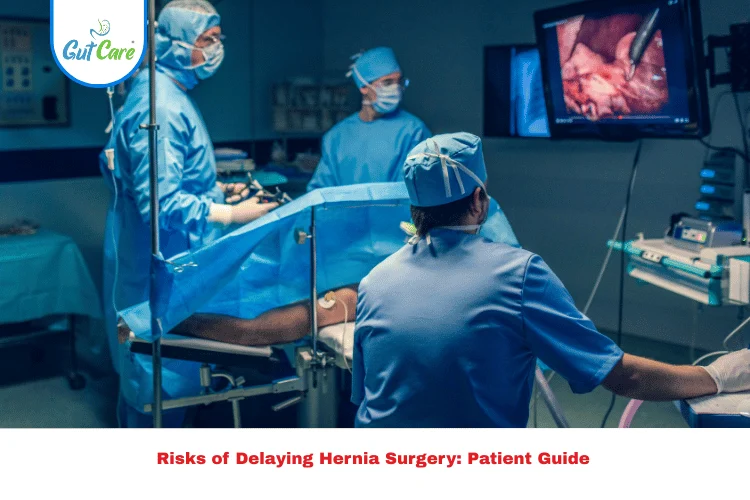An internal hernia is a hidden condition that often goes undiagnosed due to its subtle and vague symptoms. Unlike external hernias that can be seen or felt under the skin, internal hernias occur when a part of the intestine slips through a defect or abnormal opening within the abdominal cavity. If left untreated, an internal hernia can lead to bowel obstruction and potentially life-threatening complications.
At Gutcare Clinics in Bangalore, leading gastroenterologist Dr. Yuvaraj Singh Gehlot regularly treats patients with undiagnosed abdominal issues, many of which are traced back to internal hernias. This blog aims to explain everything you need to know about internal hernias—symptoms, causes, types, treatment options, and home remedies for temporary relief.
What is an Internal Hernia?
An internal hernia refers to the abnormal protrusion of the small intestine or another organ through a defect within the abdominal cavity, such as a mesenteric gap or peritoneal fold. This condition is different from more common types of hernia, like inguinal or umbilical hernias, which occur externally.
Because internal hernias are not visible and their symptoms are nonspecific, diagnosis often gets delayed until complications like bowel strangulation occur. This makes awareness and timely medical consultation extremely important.
Common Symptoms of Internal Hernia
Symptoms of an internal hernia can range from mild digestive discomfort to severe, acute abdominal pain. Here are the most frequently reported signs:
- Intermittent or continuous abdominal pain, often in the middle or lower abdomen
- Bloating or distention, especially after meals
- Nausea and occasional vomiting
- Loss of appetite
- Difficulty passing stool or gas
- Unexplained weight loss
- Symptoms that come and go without a clear cause
These symptoms may mimic other gastrointestinal conditions, making internal hernias difficult to detect without imaging studies or surgical exploration.
Causes of Internal Hernia
Understanding what causes an internal hernia can help in both diagnosis and prevention. The most common causes include:
1. Congenital Defects
Some people are born with anatomical abnormalities, such as peritoneal pockets or mesenteric defects, that predispose them to developing an internal hernia.
2. Abdominal Surgery
Previous abdominal or pelvic surgeries, particularly gastric bypass (Roux-en-Y), can create openings through which intestines may herniate. Post-surgical adhesions or scar tissue can also contribute.
3. Abdominal Trauma
Accidents or blunt trauma to the abdomen can weaken or tear internal structures, creating spaces for organs to protrude through.
4. Inflammatory Diseases
Conditions like Crohn’s disease can lead to inflammation and structural changes in the intestinal walls, making herniation more likely.
5. Unknown or Idiopathic Causes
In some cases, internal hernias occur without any clear cause, and diagnosis happens only when symptoms become severe.
Types of Internal Hernia
Understanding the different types of internal hernia is crucial for diagnosis and management. They are generally categorized by the location of the herniation.
1. Paraduodenal Hernia
This is the most common type of internal hernia, often located near the small intestine. It can be congenital and may not show symptoms until adulthood.
2. Transmesenteric Hernia
Occurs when the bowel herniates through a defect in the mesentery, the tissue that attaches the intestines to the abdominal wall. This type is especially dangerous due to the high risk of strangulation.
3. Foramen of Winslow Hernia
This rare form involves the intestine herniating into the lesser sac of the abdomen through the foramen of Winslow.
4. Pericecal Hernia
This occurs near the cecum and can mimic symptoms of appendicitis.
5. Intersigmoid Hernia
In this type, the intestine herniates between the folds of the sigmoid mesocolon.
6. Retroanastomotic Hernia
Often seen in patients who have undergone previous intestinal surgery, especially after a gastric bypass.
Each type requires a specific surgical approach, making accurate diagnosis essential.
Treatment Options for Internal Hernia
Surgical Treatment
Surgery is often the definitive treatment for internal hernias. Depending on the severity and location, laparoscopic or open surgery may be performed to reposition the herniated bowel and close the defect.
At Gutcare Clinics, Bangalore, Dr. Yuvaraj Singh Gehlot specializes in minimally invasive laparoscopic procedures that reduce recovery time and minimize complications.
Conservative Management
In rare and mild cases without obstruction or ischemia, conservative management with close monitoring may be considered. However, this is uncommon and usually temporary.
Home Remedies for Temporary Symptom Relief
While home remedies cannot cure an internal hernia, they may help alleviate mild or intermittent symptoms until professional help is available. It is essential to note that these are supportive and not substitutes for medical care.
1. Warm Compress
Benefits: Helps relieve cramps and abdominal tension.
How to Use: Apply a warm (not hot) heating pad to the abdomen for 15-20 minutes, 2-3 times a day.
Precaution: Avoid direct skin contact to prevent burns.
2. Ginger Tea
Benefits: Known to aid digestion and reduce nausea.
How to Use: Boil fresh ginger slices in water and consume 2-3 times daily.
Precaution: Avoid high doses if you are on blood thinners or have acid reflux.
3. Eat Light, Frequent Meals
Benefits: Reduces pressure on the abdomen and prevents bloating.
How to Use: Consume smaller meals every 3-4 hours instead of three large meals. Precaution: Avoid greasy, spicy, and processed foods.
4. Gentle Yoga or Stretching
Benefits: Certain positions can enhance digestion and relieve mild discomfort.
How to Use: Try light stretching exercises like the Child’s Pose or Cat-Cow Stretch.
Precaution: Do not perform yoga if pain worsens or if there’s a history of hernia complications.
5. Stay Hydrated
Benefits: Aids digestion and prevents constipation, which can exacerbate symptoms.
How to Use: Drink 8-10 glasses of water daily.
Precaution: Limit caffeine and carbonated beverages that can cause bloating.
Always consult a healthcare provider before relying on any home remedies, especially if the symptoms are recurring or intensifying.
Conclusion
An internal hernia is a complex but treatable condition if diagnosed early. Recognizing the symptoms, understanding the risk factors, and being aware of the various types of internal hernia can help you take timely action. While home remedies may provide short-term relief, they do not address the underlying issue.
If you suspect you may have an internal hernia or are experiencing unexplained abdominal symptoms, don’t delay. Reach out to Gutcare Clinics in Bangalore, where experienced professionals like Dr. Yuvaraj Singh Gehlot can provide expert diagnosis and care.
Frequently Asked Questions (FAQs)
1. What are the early signs of an internal hernia?
Signs of an internal hernia include intermittent pain in the abdomen, feeling of fullness in the abdomen, nausea, and discomfort in digestion.
2. Can an internal hernia heal on its own?
An internal hernia will not typically heal on its own. In fact, an internal hernia will typically get worse and can lead to serious complications, such as bowel obstruction or bowel strangulation.
3. What type of internal hernia are most common?
Most common internal hernias are: paraduodenal (majority), transmesenteric (minority), and foramen of Winslow (minority). Each internal hernia type has its own risk and reflected vessels that should be noted at diagnosis.
4. Are there any effective home remedies for internal hernias?
There may be potential benefits to applying warm compresses to the area of discomfort, ginger tea, or eating lighter meals, while these home remedies could help with mild internal hernia symptoms, they are not remedies for internal hernias. Medical consultation is warranted to ensure proper diagnosis and treatment.
5. Do Gutcare Clinics in Bangalore treat internal hernias?
Gutcare Clinics in Bangalore, led by Dr. Yuvaraj Singh Gehlot, treat internal hernias with the latest advanced laparoscopic surgical approaches.




